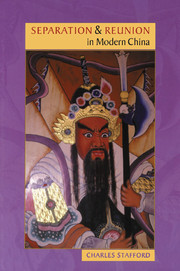Book contents
- Frontmatter
- Contents
- Acknowledgements
- Introduction: an anthropology of separation
- 1 Two festivals of reunion
- 2 The etiquette of parting and return
- 3 Greeting and sending-off the dead
- 4 The ambivalent threshold
- 5 Commensality as reunion
- 6 Women and the obligation to return
- 7 Developing a sense of history
- 8 Classical narratives of separation and reunion
- 9 The politics of separation and reunion in China and Taiwan
- Conclusion: the separation constraint
- Notes
- References
- Index
5 - Commensality as reunion
Published online by Cambridge University Press: 22 September 2009
- Frontmatter
- Contents
- Acknowledgements
- Introduction: an anthropology of separation
- 1 Two festivals of reunion
- 2 The etiquette of parting and return
- 3 Greeting and sending-off the dead
- 4 The ambivalent threshold
- 5 Commensality as reunion
- 6 Women and the obligation to return
- 7 Developing a sense of history
- 8 Classical narratives of separation and reunion
- 9 The politics of separation and reunion in China and Taiwan
- Conclusion: the separation constraint
- Notes
- References
- Index
Summary
In many of the specific examples I have thus far given of separation and reunion in China – for instance, the case in chapter two of the nephew who visits his father's sister, and quietly eats and drinks as his aunt strives to ‘accompany’ (pei) him – my descriptions have turned, often sooner rather than later, to the sharing of meals. Needless to say, more than food is being shared, and of course the centrality of food to Chinese culture makes it difficult, if not impossible, to discuss any major topic (whether kinship or religion or politics) without questions of eating and commensality coming into play (cf. Chang 1977 and Anderson 1988). Food is redundantly a central aspect of Chinese kinship symbolism: e.g. to be a family is to eat rice together, whereas to ‘divide the family’ (fenjia) is to divide the family's stove, and so on. Familial rituals of the life-cycle, perhaps especially the sending-off of the dead (songzang), entail food symbolism of a remarkable complexity and sophistication (cf. Thompson 1988). Local popular religion also routinely involves food-based sacrifice and commensality on a grand scale (cf. Ahern 1981; also see my discussion of the Penghu ‘sending-off’ in chapter three). Meanwhile, the ‘art of social relationships’ in China, at least in public and formal terms, is intimately linked to the arts of gift-giving (the gifts are often food) and banqueting (cf. Yan 1996 and Yang 1994).
- Type
- Chapter
- Information
- Separation and Reunion in Modern China , pp. 99 - 109Publisher: Cambridge University PressPrint publication year: 2000



